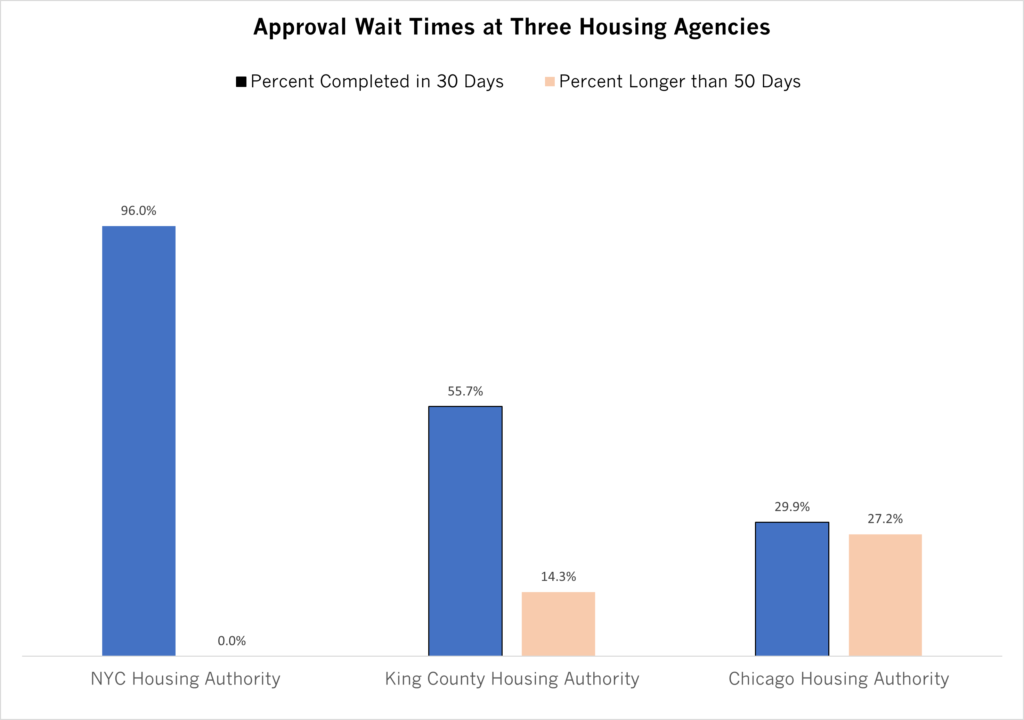More than ninety-five thousand Chicagoans rely on federally funded housing-choice vouchers to afford their apartments each month. The vouchers, commonly referred to as “Section 8” after the part of the 1937 Housing Act that mandated them, are distributed by the Chicago Housing Authority (CHA) and pick up the cost left over after tenants pay thirty percent of their income toward the cost of renting market-rate apartments.
Before a voucher-holding tenant can move into their apartment, both the landlord and the unit must undergo a federally mandated background check and inspection process. The CHA’s inspection and approval process can often drag on for weeks, and is significantly slower, on average, than those of at least two other public housing agencies.
Because the vouchers help tenants afford market-rate apartments, they’re supposed to provide low-income renters with choice in where to live. Chicago’s housing voucher program has apparently failed to provide this mobility; more voucher holders live in South Shore and Austin than in all of the city’s nineteen majority-white communities combined. The slowness of the request for tenancy approval—or RTA, also called the “lease-up,” process—may contribute to voucher holders’ reduced ability to compete for apartments, thereby impacting their mobility.
Via Freedom of Information Act requests, the Weekly obtained data from the CHA showing how long it took tenants to get approved to move into their units last summer, as well as comparable documents from the New York City Housing Authority and the King County Housing Authority, which services the metro area around Seattle. CHA provided data from April 9 to August 11, 2020; NYC, from April 9 to September 17; and King County, from April 9 to September 20.
An analysis found that during that period, some thirty percent of Chicago tenants were able to complete the lease-up process in thirty days or less, compared with fifty-six percent of tenants in King County, and ninety-six percent of tenants in NYC’s Housing Authority. More than twenty-seven percent of Chicago tenants waited longer than fifty days for their lease-up, compared to fourteen percent in King County. Zero tenants in NYC waited more than fifty days for their lease-up during the period we analyzed.

Chicagoans who hold vouchers already face a slew of challenges finding apartments, many of which stem from long-entrenched racism and discriminatory housing practices. The lagging lease-up processing times only add to the difficulty. Researchers who study housing cite the vouchers’ low value and landlord discrimination as key factors as to why vouchers don’t provide mobility. Landlords who can make more money from private market tenants have less incentive to accept voucher holders and may also be biased against them, perceiving voucher holders as unreliable tenants. A 2015 study published in Housing Policy Debate found landlords consider voucher holders unattractive because accepting them as tenants required too much paperwork, inspections, and often entailed administrative errors on the part of public housing agencies.
“Poor administration of voucher rental applications and extended lease-up processes only compound the obstacles of discrimination and poverty, making it extremely difficult to compete with non-voucher-assisted renters,” said Ben Goldsmith, an independent housing researcher who worked with housing choice voucher holders for several years. “The toll is enormous. It creates a race to the bottom in which only the least desirable rentals are within reach. It hinders mobility and magnifies segregation rather than combating it.”
The CHA gives itself more time for its lease-up process than either the NYC or King County housing agencies do. The CHA says its RTA process takes thirty-six days, whereas NYCHA states that owners can expect new lease contracts approved in thirty days or less and King County’s administrative plan explains that move-ins can occur after a fifteen-day apartment and landlord approval process.
Though the landlord approval step of the CHA’s RTA process has a seven-business-day target length, Goldsmith, who worked with voucher tenants while employed at Housing Choice Partners from February 2018 to June 2019, said the actual approval process takes “minutes, not weeks.”
Much of the responsibility for the lethargic pace of lease-up approvals may fall with the private contractor who administers the voucher process, Nan McKay & Associates, which calls itself “the leading provider of professional services to the affordable housing industry.” Records obtained via a FOIA request and reviewed by the Weekly show that between October 2019 and January 2020, the firm fell below the CHA’s performance benchmarks—sometimes by as much as seventy percent—in the majority of areas that the CHA measures. In one example, Nan McKay produced a Housing Assistance Payments contract (a document needed to complete a lease-up for a voucher holding tenant) on time in only thirty-eight percent of cases over this time.
When the firm fails to meet its benchmarks, the consequences are minimal: Nan McKay earns a one- or two-percent pay increase for meeting benchmarks, and a similarly small pay cut for failing to meet benchmarks.
Voucher holder Angela Lacy dealt with the effects of lengthy move-in times and administrative errors firsthand in 2014, when she had to move from her unit at Hyde Park Towers after the property owners decided they no longer wanted CHA voucher holders in the building.
Lacy sent her request to move to the CHA, requesting access to the Amli Building, an accessible property whose Loop location would help with her disability. After the initial request languished, she found out that her paperwork had been lost internally. When the CHA inspectors went to look at her prospective unit to approve it for usage, they inspected the wrong unit.
During the five months Lacy waited for a decision about the unit, she experienced homelessness. Ultimately, after weeks without her own apartment, she was surprised to find out that the owner of the Amli Building had refused to accept the rent the CHA was offering. At the time, Greg Mutz, Amli’s CEO, said in a statement to Crain’s that “Amli does not support the push to provide luxury rental housing to a lucky few when so many are on the waiting list for basic housing.” Then-mayor Rahm Emanuel vowed the CHA would stop the practice.
In the end, Lacy was denied the apartment. She ultimately moved into her current home, a property with dysfunctional elevators that sometimes require her to take the stairs, against the advice of her surgeon.
“I have a disability, so I needed a place that was safe for me,” she said. “I ended up in a building that is not ADA compliant… I don’t trust the CHA right now.”
The CHA’s approval process can also be compounded by long background checks that landlords conduct on their prospective tenants. One voucher holder who spoke to the Weekly on condition of anonymity said that several landlords failed CHA background checks while she was trying to move. In the process, she lost $1200 in application fees.
Goldsmith said that the CHA should find a way to process RTAs more efficiently, particularly because landlords are unlikely to keep a unit vacant on the off chance CHA will approve it for vouchers. “They can start by doing what many other cities and counties are doing and conducting more of the approval process concurrently, frontloading approval of the monthly rent and lease so that once a unit is inspected all parties know that their search for an apartment or a tenant is over.”
The CHA did not provide comment by press time.
Lacy said she is looking to move again, this time to a property that’s better-suited to her disability, but she fears that the CHA’s lease-up process will cause similar problems as those she faced before.
“I have anxiety over [moving] because in the back of my mind [the CHA] could stop this again and then I’ll be right back where I started from,” she said. “I just want to be in a place where I… can take the elevator, and if something goes wrong I can leave, instead of feeling anxiety and worry.”
Correction, February 4, 2021: A previous version of this story misstated how many Chicagoans rely on vouchers. The correct number is ninety-five thousand, not forty-nine thousand.
Morley Musick is a writer and reporter from Chicago. He last covered the DuSable Museum’s virtual-reality MLK exhibit




CHA has people that work for them like they are doing scene from saved by the bell , very juvenile behavior they can do a hell of lot better by firing the ones that don’t follow up on potential tenants and the buildings that take application fees should be refunded, there are empty buildings all along the North and near North side of. Chicago except they have RACIST foreigners as landlords and property managers straight out of the eastern block era ! CHA needs an overhaul soon
Why it take 25yrs to get in CHA
I have a Sec8 voucher and so far the experience has been hopeless. I don’t understand why I can’t find a place. Nobody wants to help me. I’m just going to be homeless and living with people forever!!! I just want my own home to live in I just want someone to help me please.
Patrice, I agree. It’s like the slumlords perpetuate a false pretense about voucher recipients so they can continue to scam the system and good renters never match up with good landlords who deserve the direct deposits that help someone get back on their feet. Mine increased my rent during lock down by 50% and our common areas were never cleaned once plus had criminal squatters that still live in the building terrorizing the paying tenants.
HUD has never stood behind there mission when in fact they own 95% of all the land in U.S. They have the access to penalize ever owner who violates fair housing. But no one to call when it is in fact Father HUD..I have been homeless 2x with a voucher due to long RTA approval process. I have applied for several positions within CHA in which I qualify but later disqualified because I have a hcv voucher.. I have had a section 8 voucher for a little over 10 years. I have earned 2 degrees, first generation college graduate. After obtaining a Masters degree I will income out very soon to pass on this blessings.